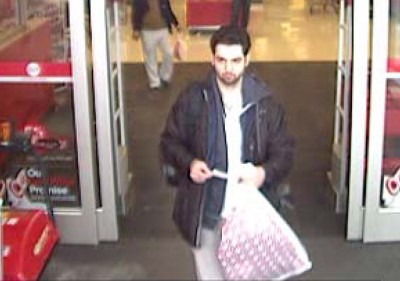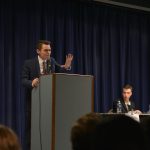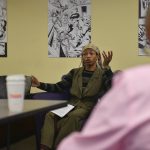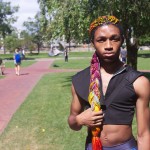After 13 days of testimony and 86 witnesses, the trial of Dzhokhar Tsarnaev continued Wednesday. Tsarnaev, a 21-year-old former University of Massachusetts Dartmouth student, is accused of placing two bombs at the finish line of the Boston Marathon on April 15, 2013, killing three people and injuring more than 260. He has pled not guilty to the 30 counts he has been charged with.

FBI Special Agent Kimberly Franks resumed her testimony from Tuesday, when she told the court about her investigation of Tsarnaev’s dorm room at UMass Dartmouth.
Franks presented evidence recovered from Tsarnaev’s dorm room, which included a three-subject spiral notebook, a book titled “Soldiers of God,” a bag of BB’s and a Big Snow Mega-banger fireworks canister.
During cross-examination, defense attorney Miriam Conrad highlighted the fact that this evidence did not definitely prove Tsarnaev had a gun in the dorm.
“The receipt was for the BB gun,” Conrad said during cross-examination. “And you didn’t find any actual firearms in the room.”
After Franks, the prosecution called upon Special FBI Agent Christopher Derks, who showed more than 100 pieces of physical evidence found at the apartment of Tsarnaev and his deceased brother and alleged co-conspirator Tamerlan.
Derks was part of the team that investigated the scene and collected evidence from the Tsarnaevs’ apartment on April 19, 2013.
“I was what we call the seizing agent. I saw every item that was seized. I saw it in place,” he said.
Franks said the apartment was a three-bedroom, one-bathroom small apartment under 800 square feet on Norfolk Street in Cambridge. The attorneys showed Derks an interactive diagram of the apartment, and the witness went through each section, detailing the evidence seized in each location.
In the entrance to the room where Dzhokhar slept, Derks found a large black flag that resembled the jihadist black flag. He stood up, unraveled the flag and held it up for the court. Derks found two smaller versions of the flag in other areas of the house as well.
Derks recovered a carbon dioxide-powered BB gun, gun cleaning equipment and a “small bullseye target just for target practice shooting BB guns” in the apartment.
In the back room of the apartment, Derks’ team found the area most likely used to construct the pressure cooker bombs detonated at the marathon, he said.
“It almost looked like a construction site. There were tools everywhere, lots of debris,” he said. “The [Evidence Response Team] members were there for a long time.”
In the room, Derks’ team found tools used to make an explosive device, including a gray rubber pressure cooker gasket, a hobby fuse that acted as an igniter, a wire cutter and several types of tape. There was such a mix of tools and equipment that Derks said they had to mark it as one entire evidence item at the scene before examining the items individually in a lab.
In order to tie Dzhokhar to the apartment and creation of the bombs, the prosecution also entered into evidence Dzhokhar’s immigration naturalization citizenship form, Internal Revenue Service tax forms in his name and his passport.
Christian Fierabend, an FBI special agent on the violent crime squad, was questioned by the defense regarding the purchase of the pressure cookers from Macy’s department store, the only retailer that sells the type of pressure cooker that was used to make the bomb.
Fierabend said the FBI used data also extracted from a GPS device, recovered from the Mercedes-Benz the brothers allegedly stole following the bombings. That data revealed a March 6 trip to New Hampshire, where the brothers made stops for BB’s at two separate New Hampshire Wal-Mart stores.
Also included was surveillance evidence of Tamerlan purchasing two backpacks from a Watertown Target store — pieces of which were found scattered at the sites of the two bombings on Boylston and Laurel Streets. The defense stressed the point again and again: it was Tamerlan who got the materials and it was Tamerlan who influenced Dzhokhar to perform the act of terrorism.
Kenneth Benton, another FBI special agent, was called to the stand to describe his participation in the landfill search conducted the week of the bombings. His team of agents and hazardous response specialists combed through trash for three days until they found what they were looking for — Dzhokhar’s backpack.
“I pulled it out, and it matched the description we were interested in,” Benton said. “After I pulled that white piece of paper out, what I saw was a crushed yellow and blue cardboard canister.”
Photographs of the backpack’s contents, presented to the jury, included fireworks, a thumb drive and school papers from UMass Dartmouth.
In the cross examination, Conrad responded in saying that it was Dzhokhar’s friend, Dias Kadyrbayev, who removed the backpack from Dzhokhar’s dorm room and placed it into the dumpster, wrapped in a black plastic garbage bag.
Next on the stand was Olga LaFond, an FBI linguist who translates Russian to English and vice-versa. She told the jury that she reads the documents for meaning first, and then translates the material.
“We translate not word-for-word but meaning-for-meaning,” LaFond said. “We go more with accuracy than the pretty stuff.”
LaFond said she did not translate all the evidence presented, but reviewed them for court, as she does on a normal basis.
One piece of evidence she translated was a file found on Dzhokhar’s computer called “Why Do We Hate Them?”
Among other documents were strings of tweets — including “I wish your rigid heart could feel that hoodlum’s love is truly real” — as well as lyrics from Russian rap songs. After a quick cross-examination from defense attorney William Fick, Muna Shishani another linguist, was called to the stand.
Shishani translates Chechen and Arabic and confirmed that Arabic words and prayers are often sprinkled into conversation in Muslim countries, even when those people do not speak Arabic as a primary language.
The last witness called was Heidi Williams, an FBI agent who role-played with prosecutor Aloke Chakravarty in reading text messages recovered from the defendant’s laptop computer, with profane language peppered throughout. In a cross-examination by Fick, the defense focused on a text in which Dzhokhar claims to be sober from drugs and alcohol for a month because of the positive influence of his older brother.
In the text messages, Dzhokhar also talked with a friend about his future. The friend said he would make a good “sniper, pyro” or “engineer.”
Dzhokhar responded, “I want to bring justice for my people.”
Testimony is scheduled to continue on Thursday.
Editor-in-Chief. Bostonian by way of Indiana. Excessive Instagrammer. Seltzer addict. Journalism junkie, storytelling fiend.














